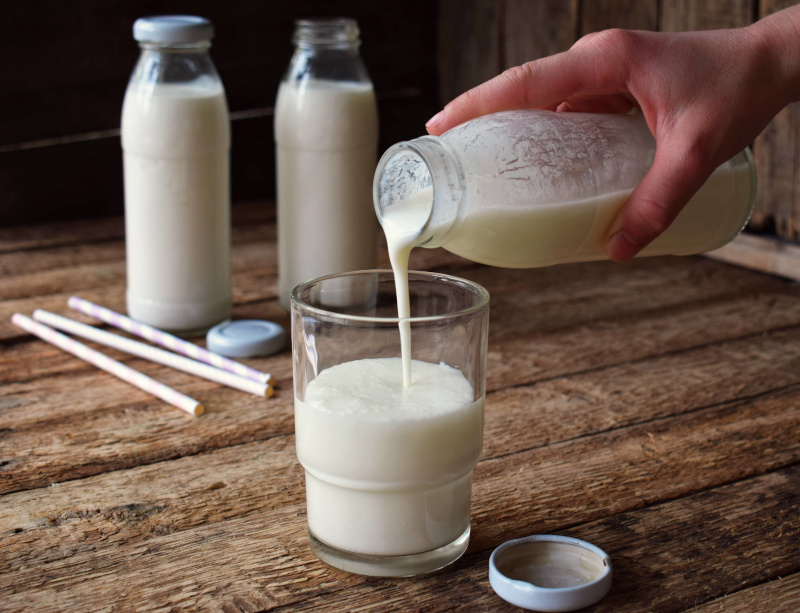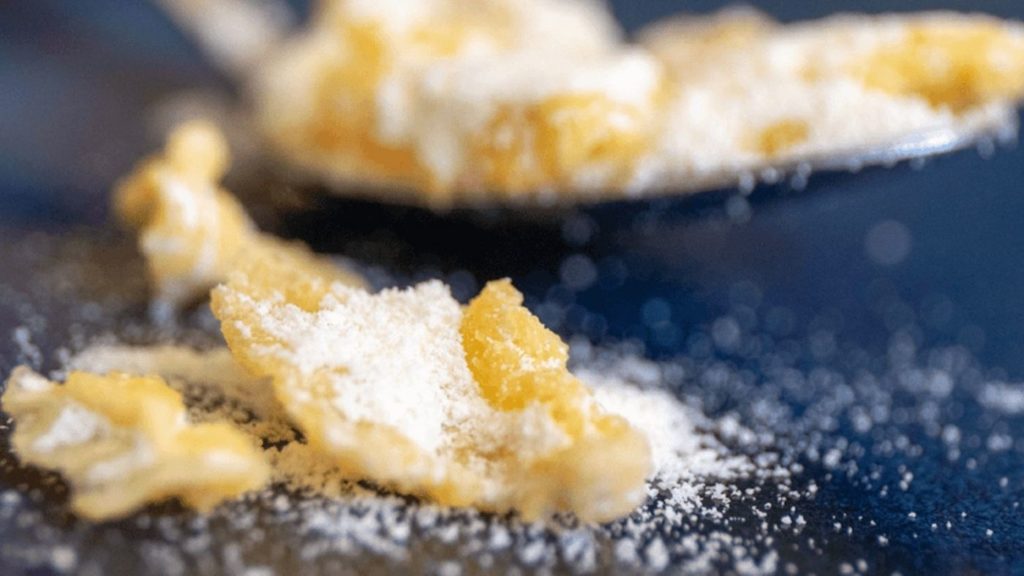Discover the health benefits of milk kefir, a fermented drink with many virtues! In this article, we will reveal the secrets of this ancestral beverage and demonstrate its health benefits based on the most up-to-date scientific publications.
Kefir has a wide range of benefits, supported by numerous scientific studies. Whether it’s to improve your digestion, reduce inflammation, strengthen your bone health, or promote a healthy balance in your gut flora (a veritable treasure trove of probiotics), this amazing beverage has it all.
Go directly to the section that interests you:
- Milk kefir is nutritious
- It helps digestion
- It is a source of probiotics
- It nourishes the microbiota
- It helps maintain bone health
- It reduces inflammation
- Skin benefits
- What are the possible risks?
- How much to consume?
What Is Milk Kefir?
Milk kefir is a fermented drink made from animal milk (from cows, goats, sheep, camels, etc.). Kefir has a very creamy texture, halfway between milk and yogurt. It has a tangy taste and can be slightly effervescent on the palate.
Milk kefir is traditionally prepared with milk kefir grains. The grains look like small, translucent, gelatinous cauliflowers. They are home to a large colony of microorganisms, including yeast and good bacteria, which are responsible for transforming milk into kefir.
To find out more, see What Are Milk Kefir Grains?
The history of milk kefir grains goes back thousands of years. Immerse yourself in their rich history by reading our article: The Fascinating Origins of Milk Kefir Grains.
Kefir is drunk on its own or as a substitute for milk and yogurt in recipes for smoothies, muffins, cereals, pancakes, and more.
Milk Kefir Is a Nutritious Drink
Animal milk is a good source of many nutrients, including protein, fat, calcium, and numerous vitamins.
Fermentation into kefir takes milk to a new nutritional level! During fermentation, the microorganisms enrich the milk by synthesizing vitamins and creating new bioactive compounds.
Fermentation enriches the quantity of vitamins B1, B12, folic acid, calcium, and amino acids in kefir (ref.).
The following table shows the nutritional values of milk kefir per 1 cup (250 ml) portion (ref).
| Nutrient | Amount |
|---|---|
| Protein | 9 g |
| Calcium | 316 mg |
| Phosphorus | 255 mg |
| Potassium | 399 mg |
| Vitamin B12 | 0.7 µg |
| Riboflavin (B2) | 0.328 mg |
| Magnesium | 29.2 mg |
| Vitamin D | 2.43 µg |
Kefir Helps Digest Lactose
Thanks to fermentation, kefir makes milk easier to digest, especially for people who are lactose intolerant. During fermentation, the microorganisms in kefir transform lactose into simpler sugars that are easier to digest.
People suffering from lactose intolerance can often consume kefir without suffering the typical side effects of milk (ref.).
What’s more, the microorganisms present in kefir can survive the journey through our stomachs and continue their beneficial work in our intestines (ref.). Drinking kefir with a meal could therefore have beneficial effects on digestion and the absorption of nutrients.
Several studies have looked at the beneficial effect of kefir consumption on irritable bowel syndrome (IBS). Kefir could help reduce the symptoms and side effects of IBS (ref.).
Kefir Is a Source of Probiotics
Milk kefir contains more probiotics than any commercial yogurt!
Foods high in probiotics are foods containing a significant source of bacteria that have a proven positive effect on health (ref.).
Kefir is packed with over sixty varieties of good bacteria and yeast (ref.). In comparison, the yogurt you find in the grocery store usually contains only two varieties of bacteria.
As mentioned above, many of the bacteria in kefir are resistant to passage through our stomachs. Once in the intestine, they join our immune system and help fight pathogens (ref.).
Kefir contains microorganisms whose beneficial effects have been recognized by science, such as lactobacillus and bifidobacterium (ref.). These bacteria play many roles in the microbiota, including fighting pathogens such as S. aureus, E. coli, E. faecalis, and S. Enteritidis (ref.).

Kefir: An Ally for the Microbiota Thanks to Kefiran (Prebiotic)
Kefir is not just a source of probiotics, these microorganisms that are beneficial to our health; it also acts as a prebiotic. It provides nutrients that nourish and encourage the growth of good bacteria in our gut microbiota.
The role of the microbiota is crucial to our health. It supports the integrity of the intestinal barrier, contributes to the balance of our immune system, and helps to control inflammation (ref.).
The production of kefiran by kefir grains makes it a valuable element in our well-being. This slightly viscous substance, also known as biofilm or exopolysaccharide, is an example of a prebiotic. Kefiran travels undigested through the stomach to our intestines. Once there, it promotes the growth of beneficial probiotic bacteria. In other words, kefiran literally feeds our microbiota! (ref.)
Milk Kefir: An Ally for Bone Health?
Milk kefir could be beneficial for bone health, in particular by helping to fight osteoporosis. In fact, one cup (250 ml) of milk kefir provides more than 25% of the recommended daily intake of calcium, a mineral that is crucial for bone health (ref.). Animal studies have even suggested that kefir may help improve the body’s absorption of calcium (ref.).
Some preliminary research in menopausal women with osteoporosis suggests that kefir may have a protective effect on bone density, potentially reducing the risk of fractures (ref.). However, these results are preliminary and need to be confirmed by further studies.
In addition, animal studies have shown that kefir may help reduce the symptoms of arthritis, although the exact mechanism remains to be clarified (ref.).
It is important to remember that, although these results are promising, more research is needed to fully confirm and understand the potential benefits of milk kefir for bone and joint health.
Milk Kefir: A Natural Anti-Inflammatory?
Milk kefir may help reduce inflammatory symptoms. In fact, animal studies have shown a reduction in inflammatory symptoms following the consumption of kefir (ref.). These effects could be linked to kefir’s capacity to stimulate the immune system and neutralize certain inflammatory molecules.
Kefir is also being studied for its possible protective effect against certain conditions linked to inflammation, such as asthma and allergies (ref.). It also appears to boost the immune system by helping to combat various pathogens (ref.).
Another factor that may play a role in kefir’s anti-inflammatory properties is its antioxidant content. These compounds help limit the damage caused by free radicals, molecules that can cause inflammation, and other health problems (ref.).
Finally, certain molecules present in kefir are currently being studied for their potential anti-inflammatory effect in wound healing (ref.).
However, we advise you to wait for further studies before putting kefir on your child’s scraped knees ;)
Kefir Could Have Skin Benefits
Milk kefir could also have skin health benefits. Researchers are beginning to explore the links between microbiota – all the microorganisms living in our bodies – and skin health. It would seem that kefir may play a beneficial role in this relationship.
One study showed that drinking homemade kefir helped reduce eczema in participants (ref.). Eczema is often linked to inflammation, a condition that kefir appears to help alleviate.
Kefir extracts have also shown promising results in wound healing and reducing acne, a skin problem often caused or aggravated by inflammation and bacteria (ref.).
As a result of these discoveries, the cosmetics industry has begun to incorporate kefir into a range of skin care products.
Kefir Grains vs. Powdered Culture: Which Is Better?
Scientific research into milk kefir focuses mainly on kefir made from kefir grains. These grains contain a wide variety of probiotics and produce a significant amount of kefiran, a beneficial substance with antimicrobial and anti-inflammatory properties (réf.).
Kefir can also be made from powdered cultures, which contain only a limited number of varieties of microorganisms. Commercial kefir is almost exclusively made from this powdered culture, mainly for reasons of ease of production and conservation.
Although kefir made from powdered culture may offer some health benefits, these are generally less studied and may be less pronounced than those of kefir made from grains. For a more detailed overview of the differences between grain kefir and cultured kefir, see the article Kefir Starter vs. Kefir Grains: Which Should I Choose?

Does Milk Kefir Present Any Risks?
Milk kefir is a fermented beverage that is safe to drink.
However, kefir is not suitable for people with a milk allergy. What’s more, although people who are lactose intolerant can often consume kefir without any issue since a large proportion of the lactose is broken down during fermentation, some may nevertheless experience symptoms of discomfort or adverse reactions.
Due to the fermentation process, kefir may also contain a small amount of residual alcohol, with alcohol levels generally varying between 0 and 1%. This is something to bear in mind for those who choose to avoid alcohol altogether.
Finally, it’s important to note that kefir is not recommended for people with weakened immune systems, without the prior approval of a health professional.
The Benefits of Kefir Unconfirmed by Science
Milk kefir is often praised for its many benefits, some of which are supported by rigorous scientific research. However, there are also claims that, while receiving some attention in the health and wellness world, have not been conclusively validated by the scientific community.
Here are two examples:
Milk kefir may promote weight loss
(Unproven) One study found that milk kefir consumption resulted in weight loss comparable to that of milk when it was included in a dairy-rich diet with no calorie restriction in overweight or obese premenopausal women (ref.).
However, due to the specific nature of this study, it is difficult to generalize these results to the entire population. More research is needed to conclusively confirm that milk kefir helps lose weight and facilitates weight loss.
Kefir may reduce the symptoms of osteoarthritis
(Unproven) After a thorough review of the available scientific publications, we found no research establishing a clear and proven link between milk kefir consumption and the alleviation of osteoarthritis symptoms.
In conclusion, milk kefir is a nutritious food offering a variety of health benefits corroborated by science. However, when it comes to claims (or legends) that have not been validated by rigorous scientific studies, it is important to adopt a cautious approach and refer to reliable sources.
How Much Kefir per Day?
It should be noted that scientific research has not yet determined a precise dosage for daily consumption of kefir. However, incorporating this probiotic-rich drink into your daily diet could potentially offer health benefits.
If you are new to kefir consumption, it is advisable to start with small portions. A sudden increase in probiotic intake may cause some temporary disruption to your digestive system and lead to undesirable side effects. A gradual approach is therefore preferable, allowing your body to adapt to this new source of probiotics.
Where to Find Milk Kefir?
If you’re looking for milk kefir, you can buy it in grocery or health food stores. You’ll find plain, flavoured, and even vegan milk kefir.
However, one option that’s gaining in popularity is making milk kefir at home. Not only is it simple and economical, but it also allows you to control the quality of the ingredients used. All you need is milk and kefir grains. Here’s how to make it:
- Pour milk into a glass jar.
- Add the kefir grains.
- Cover the jar and let it stand at room temperature for 24 to 48 hours.
- Strain to remove the kefir grains (which can be reused for future batches) and place the kefir in the fridge.
In just a few simple steps, you’ll have your own fresh, homemade milk kefir! For more details on how to make milk kefir, see our dedicated guide.

